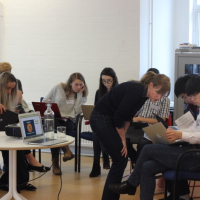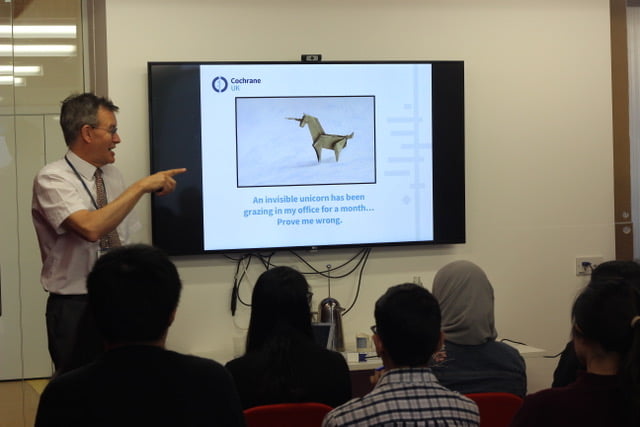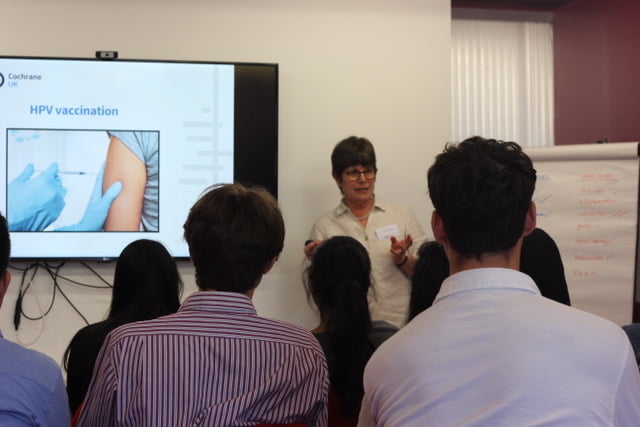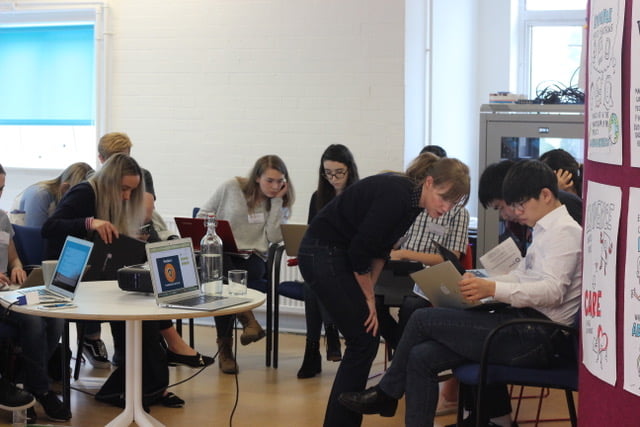
Lynda Ware, a retired GP and Senior Fellow in General Practice at Cochrane UK, and Selena Ryan-Vig, Cochrane UK’s Communications and Engagement Officer, tell us about the talks and workshops they run with secondary school students, teaching evidence-based medicine and encouraging critical thinking about health claims and advice.
Since 2016, Cochrane UK have been visiting secondary schools in and around Oxford, teaching evidence-based medicine (EBM) and highlighting its relevance in our everyday lives. We already had an established community programme, known fondly as the ‘Women’s Institute (WI) talks’, and the schools project evolved from this. To be more precise, the venture was suggested by two WI ladies, who questioned why Cochrane wasn’t speaking to young people, whose deep-rooted aversion to seeking medical help and reliance on Dr Google are well known.
In November 2016 we faced our first audience of students in an after-school Science Club. We realised immediately how hard it is to teach well and that we would have to learn quickly if we were to survive. Nevertheless, our first foray into the world of education was well received and we can now boast a growing portfolio of schools who welcome us into their classrooms.

Teaching evidence-based medicine: Martin Burton explains the difference between ‘absence of evidence’ and ‘evidence of absence’ by challenging students to disprove that he has an invisible unicorn hiding in his office…
Encouraging pupils to think critically about medical claims
In our talks and workshops we aim to bring an awareness of why it is important to question the evidence behind medical claims. We use topical newspaper headlines to illustrate how medical evidence can be misrepresented in the media – how it can sometimes be inaccurate and sometimes just plain wrong. We illustrate the relevance of evidence-based medicine on a personal, everyday level by looking at how we choose cold remedies. We consider medical interventions at national and global levels, using the HPV vaccination programme as an example. We look at what constitutes a randomised controlled trial and how a systematic review is produced.
With the unfailingly generous encouragement and feedback from the teachers we met, we soon appreciated that just talking at the students quickly lost their attention and that we needed to use interactive activities to make our points effectively. Different forms of communication, such as animations and videos, also hit the spot. We have taught pupils from Years 9-13 in formal lessons and in extracurricular science and medical clubs.

Lynda Ware challenges the students to think about how they would run their own clinical trial, and what questions they would like to answer
Special sessions: teaching evidence-based medicine to aspiring medics
Recently we ran our third and fourth extended workshops for sixth formers applying to read medicine. The third took place in June with 25 Year 12 students attending from local schools. The fourth took place in Witney, and was attended by around 22 students from local schools. Both workshops included interactive sessions with Anna Noel-Storr, to introduce Cochrane Crowd and to give a taste of what systematic reviewers do. We held another workshop for medics at the Cochrane UK office in Oxford on October 1st, with 21 students attending from five schools. You can read more about the very first workshop we ran, in October 2018, here.

Anna-Noel Storr, co-lead of Cochrane Crowd introduces a group of sixth formers to the platform.
Spreading the word…
The schools outreach project now has a momentum and we are getting known in and around Oxfordshire. We discovered that contact with schools is most successfully achieved by a posted letter (teachers are bombarded with emails and are unlikely to read them), followed by a phone call to the headteacher or head of science. We have found that it is important to emphasise that the sessions are free of charge.
In addition to our schools visits, Science Oxford invited Cochrane UK to take part in their 2019 STEM programme and we held a workshop for a group of Year 10 pupils in the Cochrane UK office. We have also contributed for the last three years to the annual Medics’ Conference, hosted by Magdalen College School.
We are very keen to extend the programme across the UK and would love to hear from others who might be interested in teaching evidence-based medicine. We would be happy to give support and training, and would also share our various slide-sets and resources. Equally, we would be delighted to hear from anyone who has undertaken similar teaching to learn about your experiences.
Join in the conversation on Twitter with @CochraneUK and @Lynda_Ware or leave a comment on the blog.
Lynda Ware’s biography can be found here.
Selena Ryan-Vig’s biography can be found here.
An earlier version of this blog was originally posted on Cochrane.org
